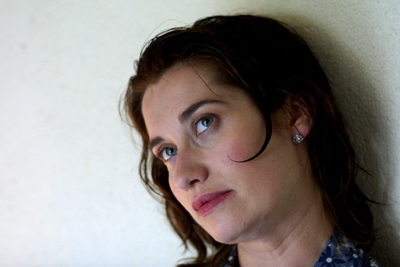|
Reviews of Recent Independent, Foreign, & Documentary Films in Theaters and DVD/Home Video
KINGS AND QUEEN
During 10 turbulent days, Nora (Emmanuelle Devos) finds out her erudite
father is rapidly succumbing to stomach cancer while her ex-boyfriend,
Ismaël (Mathieu Amalric), has been taken against his will to a mental
hospital for psychiatric evaluation. In the breezy opening voice-over, Nora
reveals why she broke up with him. According to her father, "being in love
means never having to ask," and Ismaël failed at this test. One thing Nora
and Ismaël do have common: they both are uncompromising. Nora has since moved on and is about to marry a dull,
but giving sugar daddy. Married once before, she has a son, Elias, whose
father died before he was born. Ismaël, whom the boy adores, is the only
father he has known. (He hasn't warmed up to the new husband-to-be.) Nora
seeks out Ismaël in his confinement to ask him to adopt her son.
With dream sequences, abrupt changes of tone, and a diverging story line,
Kings and Queen is anything but predictable. Filmed largely with a
hand-held camera and with plenty of jump cuts, there is a feeling of
spontaneity. But this tragic/comedic hodgepodge remains unconvincing,
mostly due to the casting. It's almost as if director Arnaud Desplechin is
daring the audience to think that actress Emmanuelle Devos isn't attractive
enough for her role. Nora is the type of woman both men and women find
remarkably pretty. Ismaël admits he sympathizes with Nora
because she's good looking. Nora is also conscious of her assets. Reminding
Ismaël why she dumped him, she tells him time is running out; being 33 is
young for a man but old for a woman. This casting discrepancy is further pointed out
by the presence of Catherine Deneuve as Ismaël's doctor. Nora is an
icy role Deneuve would have sunk her teeth into.
Another part of the problem is Devos' uneven performance. Nora is described
as insolent, cold, and proud. And as the film unfolds, this is true. But with a timid, whispery
voice, Devos' Nora comes
across as self-effacing and far too understated. Instead of an iron will,
there's petulance. And in a poorly directed flashback, a tense confrontation
between Nora and her first husband ends in a whimper; the femme fatale of
her personality is missing in action, and as her first husband, Joachim
Salinger overacts.
Also unbelievable are the unearned lessons learned by Ismaël. He transforms
from a suicidal, arrogant neurotic to a giving, thoughtful man. His
final decisions seem sudden and random. Thankfully, Amalric underplays his role, never begging
for the audience's
sympathy, except for in one painful scene. Part of Ismaëlís treatment includes
dance therapy. At first tentative, he slowing gets his groove on, winning
over a nurse to a hip hop beat. Kent Turner
|
